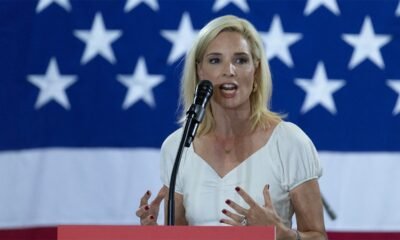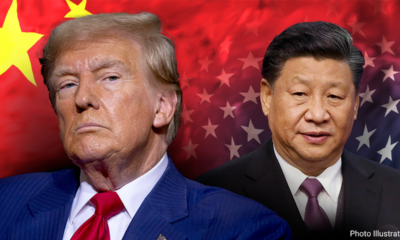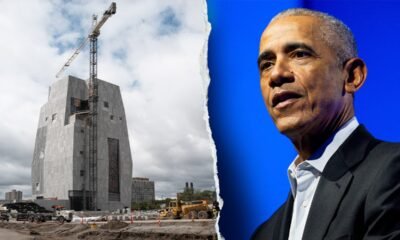INTERNACIONAL
Inside NASA’s fast-track plans for lunar nuclear power and new space stations to outpace global rivals
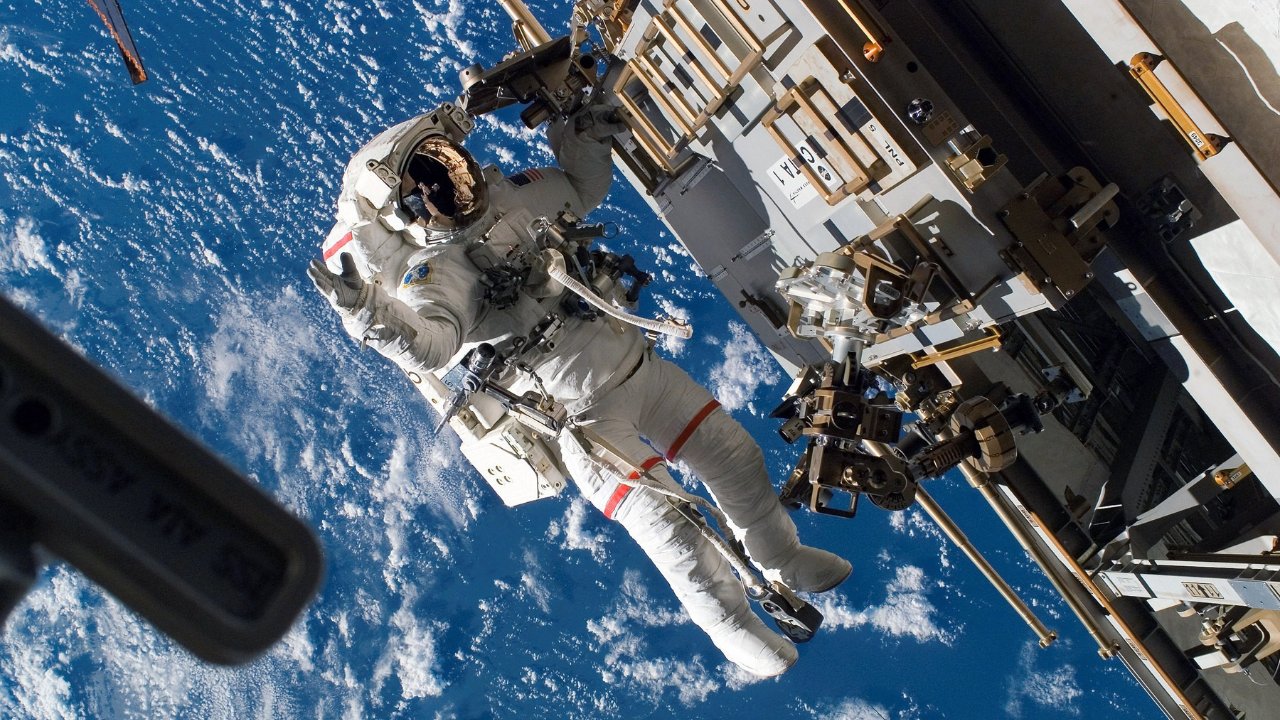
NEWYou can now listen to Fox News articles!
Amid significant budget cuts, NASA is fast-tracking the development of nuclear reactors on the moon and next-generation space stations with one clear objective: beating U.S. adversaries in the new space race.
Two new memos signed by interim NASA chief and Transportation Secretary Sean Duffy outline a bold strategy to secure strategic ground on the moon. The centerpiece of this effort is a lunar nuclear reactor, a renewable and stable power source to support long-term exploration.
«The goal is to power everything,» a senior NASA official told Fox News Digital. «Our systems, habitats, rovers, robotic equipment, even future mining operations — everything we want to do on the moon depends on this.»
The moon’s environment makes this a necessity. Its month-long day cycle — two weeks of daylight followed by two weeks of darknessc — renders solar power unreliable. A reactor would allow missions to function around the clock.
TRANSPORTATION SECRETARY DUFFY TO ANNOUNCE NUCLEAR REACTOR DEVELOPMENT PLAN FOR THE MOON
NASA is soliciting proposals from private firms for new commercial space stations and a lunar nuclear reactor. (SpaceX)
China and Russia set sights on the moon
NASA officials warn that China and Russia have publicly announced plans for a joint lunar nuclear project by the mid-2030s. If they succeed first, they could establish exclusive control over the moon’s most valuable areas, locations with the most light and access to water and ice.
«They could set up a ‘keep-out zone’ in the prime locations,» the NASA official cautioned.
Despite financial constraints, Duffy’s leadership signals a renewed priority to lunar and Martian exploration.
«China has already landed on the far side of the moon. We never have,» the official added. «They’re moving on a steady path to dominate this domain.»
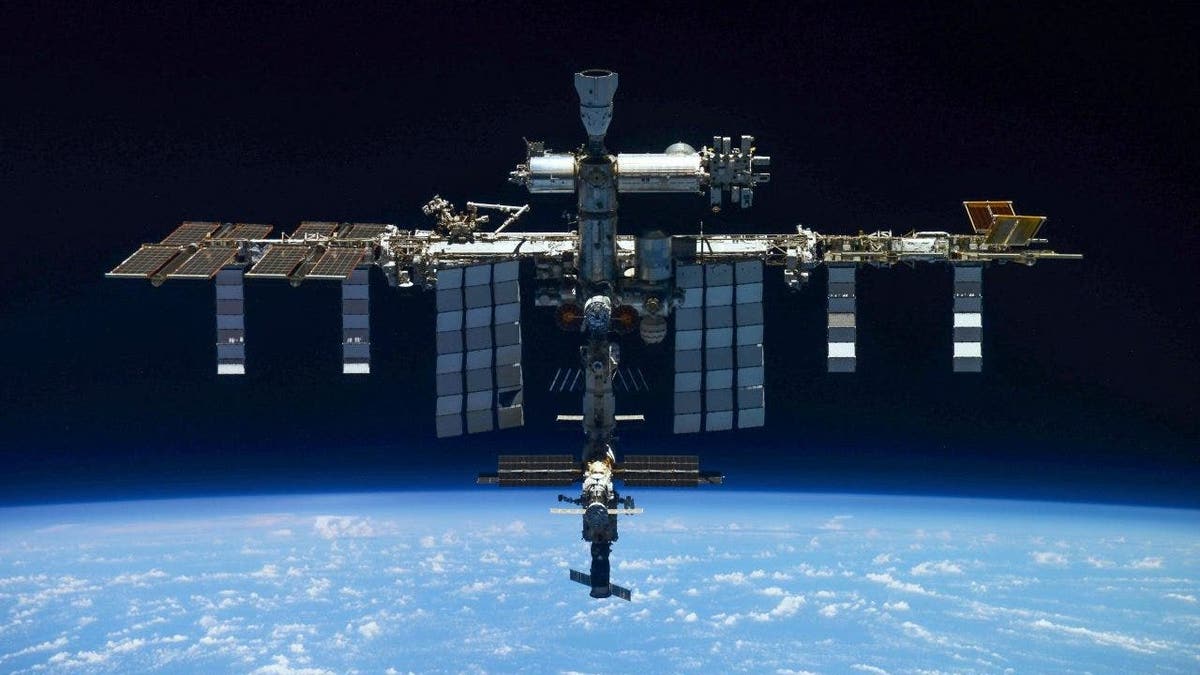
The International Space Station will exit orbit in 2030. (Roscosmos State Space Corporation via AP, File)
New contract structure for nuclear reactor development
The new directive solicits proposals for a 100-kilowatt nuclear reactor — enough to power about 80 homes — with a target launch date of 2030. It also requires NASA to appoint a dedicated program leader.
Today, many robotic spacecraft operate at just a few watts, the equivalent of a couple of light bulbs, which severely limits scientific capabilities. While the ISS uses solar panels, that model doesn’t work on the moon or Mars, where sunlight is too weak or unreliable.
Replacing the ISS: Commercial stations on the horizon
The second memo shifts focus to replacing the aging and leaking International Space Station (ISS), which is scheduled to be retired in 2030. Without a successor, China would become the only country with a permanently crewed station in orbit.
NASA now plans to select two commercial partners within six months of issuing new requests for proposals. Under Duffy’s direction, the agency is moving away from traditional fixed-price contracts and will instead use flexible Space Act Agreements, which give companies more freedom in how they build stations while saving time and money.
CHINESE SATELLITES COMPLETE GROUNDBREAKING MISSION 22,000 MILES ABOVE EARTH
«We’re telling companies what we need,» a senior NASA official said. «But we’re not prescribing how they must do it. That flexibility saves us both time and resources.»
NASA wants the new station to be cheaper and easier to maintain than the ISS. Originally, it envisioned a platform that could host two astronauts for six months. But, under the revised plan, the minimum requirement is four astronauts for just one month.

NASA wants a new commercial space station that can house four astronauts for one-month stints. (NASA via Getty Images)
Background: The Commercial Low Earth Orbit Destination program
NASA’s Commercial Low Earth Orbit Destination (CLD) initiative, launched in 2021, was structured in two phases:
- Phase 1: Fund companies — like Blue Origin and Northrop Grumman — to design private space stations.
- Phase 2: Award contracts for building and certifying selected stations.
Duffy’s directive calls for skipping fixed-price contracts in Phase 2 and continuing with Space Act Agreements, in line with tightening budget constraints.
Budget cuts reshape NASA’s future
According to the Trump administration’s fiscal 2026 budget proposal, NASA’s overall budget would drop from $24.8 billion to $18.8 billion, a 25% cut. The Science Mission Directorate, which oversees research in planetary science, astrophysics, Earth observation and heliophysics, would face a nearly 50% reduction. However, human spaceflight programs are slated for increased funding.
CLICK HERE TO GET THE FOX NEWS APP
NASA has also confirmed that nearly 4,000 employees — about 20% of its workforce — have taken voluntary buyouts in recent months.
Despite these setbacks, agency officials remain optimistic.
«Multiple companies tell us they can deliver a station within two years,» one senior official said. «Timelines are always challenging, but we believe we can meet these goals — even on a leaner budget.»
nasa,air and space,spaceflight,china,politics
INTERNACIONAL
En un acto por el aniversario de la muerte de Nasrallah, el jefe de Hezbollah dijo que el grupo terrorista no depondrá las armas

El líder del grupo terrorista libanés Hezbollah, Naim Qassem, reafirmó este sábado que no depondrán las armas, durante un acto multitudinario para conmemorar el primer aniversario de la muerte de su predecesor, Hassan Nasrallah, que se produce en medio de una iniciativa estatal para desarmar al movimiento.
“He estado siguiendo tu camino desde tu ausencia, seremos los portadores de la verdad (…) No dejaremos el frente de guerra y no abandonaremos las armas”, sentenció Qassem en un discurso emitido en grandes pantallas frente a miles de seguidores congregados a las afuera de Beirut.
“Continuaremos, seremos resilientes y estaremos listos para el martirio”, defendió el actual secretario general de Hezbollah.
Las conmemoraciones por Nasrallah, que lideró la formación durante más de tres décadas hasta su muerte hace este sábado un año, coinciden con una iniciativa del Gobierno libanés para desarmar a Hezbollah, como parte de sus esfuerzos para que solo haya armamento en manos de las fuerzas de seguridad estatales.
Este mes, el Ejército presentó un plan con este objetivo por encargo del Consejo de Ministros, que la institución castrense tiene previsto implementar en fases en función de sus capacidades.
Qassem criticó que los intentos de dejarles sin armamento buscan en verdad “desarmar al Líbano” y llamó al Gobierno a centrarse en defender la “soberanía” del país, poniendo fin a la presencia de las tropas israelíes que aún ocupan cinco puntos de su territorio.
En medio de los esfuerzos para desarmar a Hezbollah, realizados entre fuertes presiones estadounidenses, el líder del movimiento insistió en que se enfrentarán a cualquier programa que sirva a los intereses de Israel “incluso si está disfrazado como un proyecto nacional”.
Sin embargo, destacó la necesidad de mantener la “unidad interna” en el Líbano y de trabajar hacia lograr un país “fuerte”, al considerar que su formación es “la base de esa fuerza”.
“El enemigo esperaba que cayéramos, pero volvimos a tomar la iniciativa, elegimos a un nuevo secretario general y sustituimos con nuevos líderes”, zanjó Qassem.
Por su parte, el secretario del Consejo Supremo de Seguridad Nacional iraní (CSSN), Ali Larijani, llegó este sábado al Líbano para participar en las conmemoraciones por el primer aniversario del asesinato del líder histórico del grupo chií Hezbollah, Hasán Narala.
Larijani aterrizó en el Aeropuerto Internacional de Beirut acompañado por una “delegación oficial de alto nivel” para tomar parte en las ceremonias que se celebrarán esta tarde en los suburbios capitalinos, informó la Embajada iraní en el Líbano en su cuenta de X.
Este sábado tendrán lugar los actos centrales para conmemorar el primer aniversario del fallecimiento de Nasrala, que encabezó a Hezbollah durante más de 30 años y que murió en un bombardeo israelí contra una sede subterránea a las afueras de Beirut el 27 de septiembre de 2024.
El evento principal tendrá lugar en el santuario donde está enterrado el ex secretario general de Hezbollah e incluirá un discurso por parte de su sucesor, Naim Qassem, mientras que a la hora exacta de su muerte -18.21 hora local (15.21 GMT)- se han convocado vigilias por todo el país.
Hezbollah arrancó esta semana una serie de conmemoraciones por Nasrala y otros líderes asesinados el pasado año durante la guerra con Israel, actos que continuarán hasta mediados de octubre.
La fecha coincide con intentos del Gobierno libanés para desarmar al movimiento político y armado chií, que se niega a acatar la decisión mientras continúen los ataques israelíes contra el Líbano y la presencia de su Ejército en cinco áreas del territorio del país.
(Con información de EFE)
Anniversaries,Middle East,Civil Unrest,BEIRUT
INTERNACIONAL
Russia’s Sergey Lavrov warns NATO countries in UNGA speech after Trump shifts tone on Ukraine
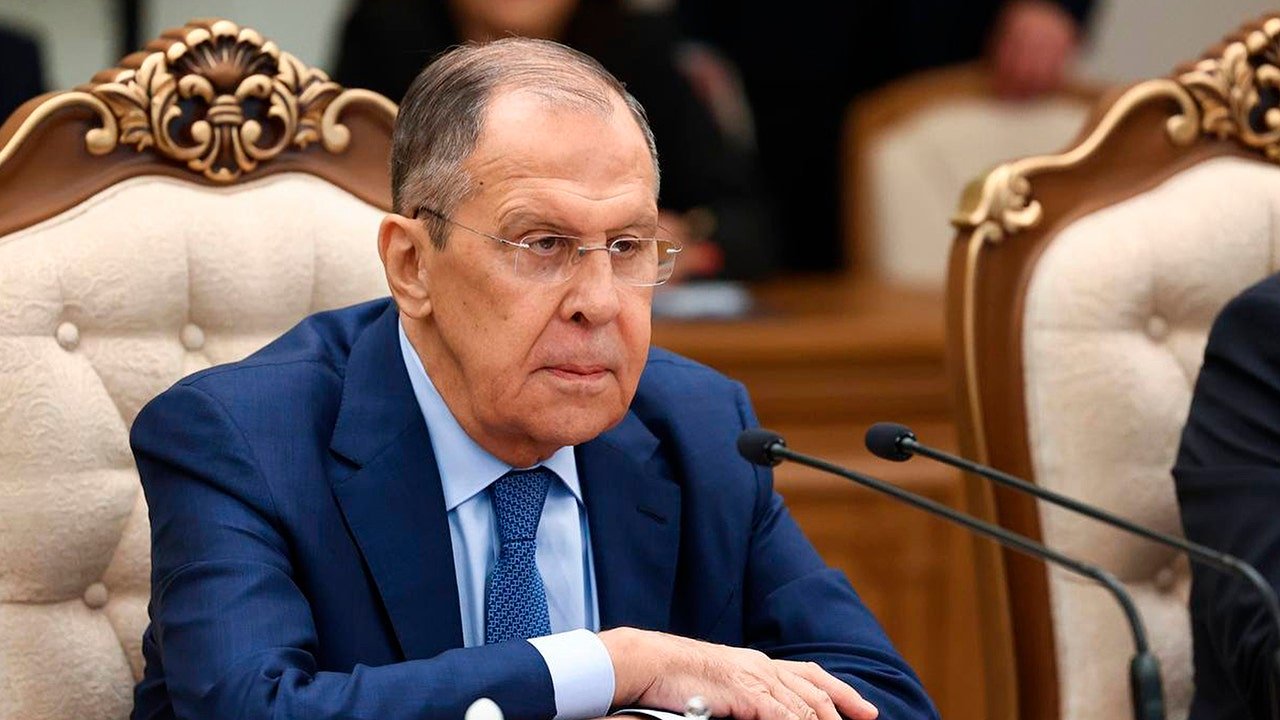
NEWYou can now listen to Fox News articles!
Russian Foreign Minister Sergey Lavrov used his address to the United Nations General Assembly (UGNA) on Saturday to deliver one of Moscow’s starkest warnings yet to the West, accusing NATO and the European Union of waging a «real war» against Russia.
Lavrov opened with sweeping historical references to World War II, positioning Russia as the heir to the Soviet Union’s role in defeating Nazism and defending global sovereignty. He accused the U.S. of dismantling those postwar principles through interventions in Yugoslavia, Iraq and Libya, and warned that the same was happening today in the Middle East.
While condemning Hamas’s Oct. 7, 2023, attack, Lavrov said Israel’s campaign in Gaza amounted to «collective punishment» of civilians, linking the conflict to what he portrayed as decades of unchecked Western use of force.
Lavrov accused NATO of ignoring decades of security commitments. He insisted Russia has «never had and does not have» plans to attack NATO countries, calling Western warnings of a Russian offensive «provocations.»
UN SECURITY COUNCIL REJECTS CHINA-RUSSIA RESOLUTION EXTENDING IRAN NUCLEAR SANCTIONS RELIEF BEFORE DEADLINE
Russian Foreign Minister Sergey Lavrov addressed the United Nations General Assembly on Saturday, issuing one of Moscow’s starkest warnings to the West yet. (Russian Foreign Ministry Press Service telegram channel via AP)
He singled out claims by European leaders as «false portrayals» of Moscow’s intentions, echoing President Vladimir Putin’s denials that Russia plans to strike NATO or EU territory. At the same time, Lavrov issued a direct threat: «Any aggression against my country will be met with a decisive response. There should be no doubt about this among those in NATO and the EU.»
The warning comes amid heightened tension along NATO’s eastern flank. Estonia recently accused Russian jets of violating its airspace, and NATO forces shot down drones over Poland. The U.S. responded by telling the U.N. Security Council it would «defend every inch of NATO territory.» Against this backdrop, Lavrov’s speech underscored Moscow’s effort to frame any clash with NATO as an existential threat to Russia itself.
The timing also intersects with a shift in U.S. rhetoric. President Donald Trump, who met with Ukrainian President Volodymyr Zelenskyy earlier this week, has hardened his tone on the war – telling reporters that Ukraine can and should reclaim all its territory.
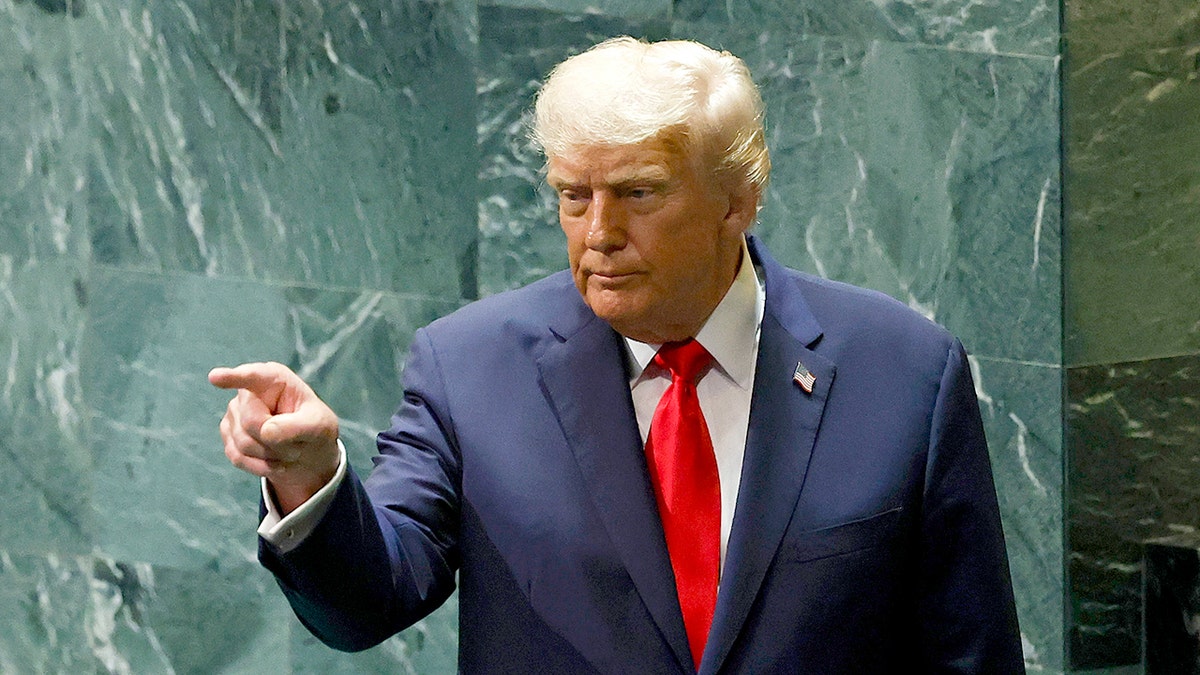
President Trump has also embraced firmer rhetoric on the war. ( Chip Somodevilla/Getty Images)
That marks a departure from earlier signals of openness to negotiation, more than a month after U.S. and Russian officials held rare talks in Alaska. Lavrov’s UN address seemed calibrated to counter Trump’s new line, reminding Washington that Moscow sees the war not as a distant conflict but as a direct confrontation involving the United States.
Ukrainian President Zelenskyy, in his own address to the General Assembly, warned that failing to stop Russia now would unleash «the most destructive arms race ever.»
Lavrov reinforced his message at a press conference after the speech, responding to a question about Western calls to shoot down Russian aircraft that might violate European airspace. He dismissed Trump’s earlier remark that Russia was a «paper tiger,» noting that the president had already walked it back.
He then issued a stark warning: «If there are attempts to down any flying object … over our territory, in our airspace, then I think people will very much regret it, undertaking such an egregious violation of our territorial integrity and sovereignty.»
WORLD LEADERS LAUGH, SQUIRM AS TRUMP BLASTS UN ON CLIMATE, UKRAINE, GAZA AT GENERAL ASSEMBLY
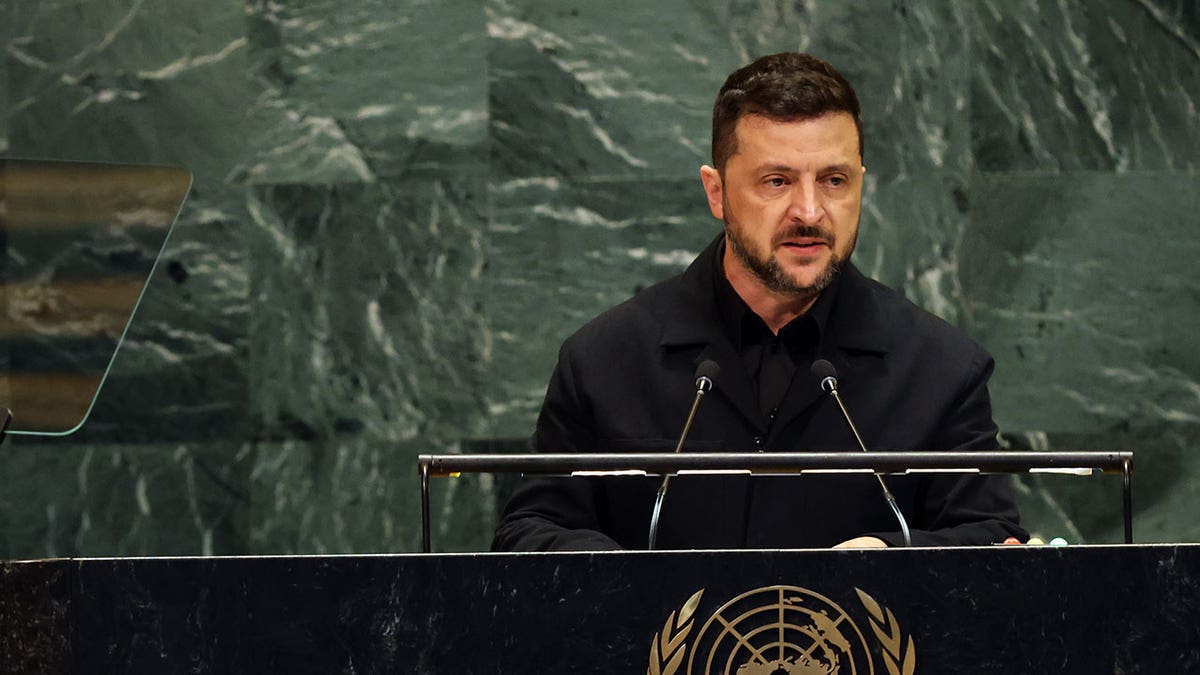
Ukrainian President Volodymyr Zelenskyy issued a warning of his own before the General Assembly: failure to stop Russia now will lead to «the most destructive arms race ever.» (Spencer Platt/Getty Images)
Lavrov also took aim at U.S. sanctions on Iran, blasting Western efforts to restore or tighten restrictions as «illegal» and evidence of what he described as Washington’s strategy of «blackmail and pressure.»
He said the West had sabotaged diplomatic options to revive the 2015 nuclear deal and rejected what he called manipulations at the U.N. Security Council to isolate Tehran.
CLICK HERE TO GET THE FOX NEWS APP
Beyond Europe, Lavrov portrayed Russia as aligned with a rising «global majority» against Western dominance, pointing to BRICS, the Shanghai Cooperation Organization, and African and Latin American calls for greater representation at the U.N. Security Council.
He accused Washington of using sanctions and military blocs to preserve hegemony, while claiming Russia was defending sovereignty for nations across the Global South.
russia,united nations,world politics,ukraine,world,nato
INTERNACIONAL
Ciattarelli unloads on Mikie Sherrill in NJ town hall, citing immigration and Naval Academy: ‘Not a centrist’
NEWYou can now listen to Fox News articles!
New Jersey GOP gubernatorial candidate Jack Ciattarelli called out his opponent, U.S. Rep. Mikie Sherrill, D-N.J., during a town hall Saturday, branding her out of step with the Garden State on immigration, policing, taxes and ethics.
«She wants you to believe she’s a Jersey girl. She’s not. She wants you to believe she’s a centrist. She’s not,» Ciattarelli told voters.
The remarks preview Ciattarelli’s closing argument in a tight race for the state’s top post, as he seeks to define Sherrill by tying her to national Democrats and controversies over immigration enforcement, policing and left-wing allies. Both campaigns have been asked for comment.
Ciattarelli charged that Sherrill «supported Joe Biden’s open border policies» and «voted no on the Laken Riley Act.» Sherrill missed the Riley Act vote earlier this year but later said she would have voted no, arguing the measure was overly broad.
AFFORDABILITY TAKES CENTER STAGE IN NEW JERSEY GUBERNATORIAL RACE AS NOMINEES SPAR OVER SALES TAX
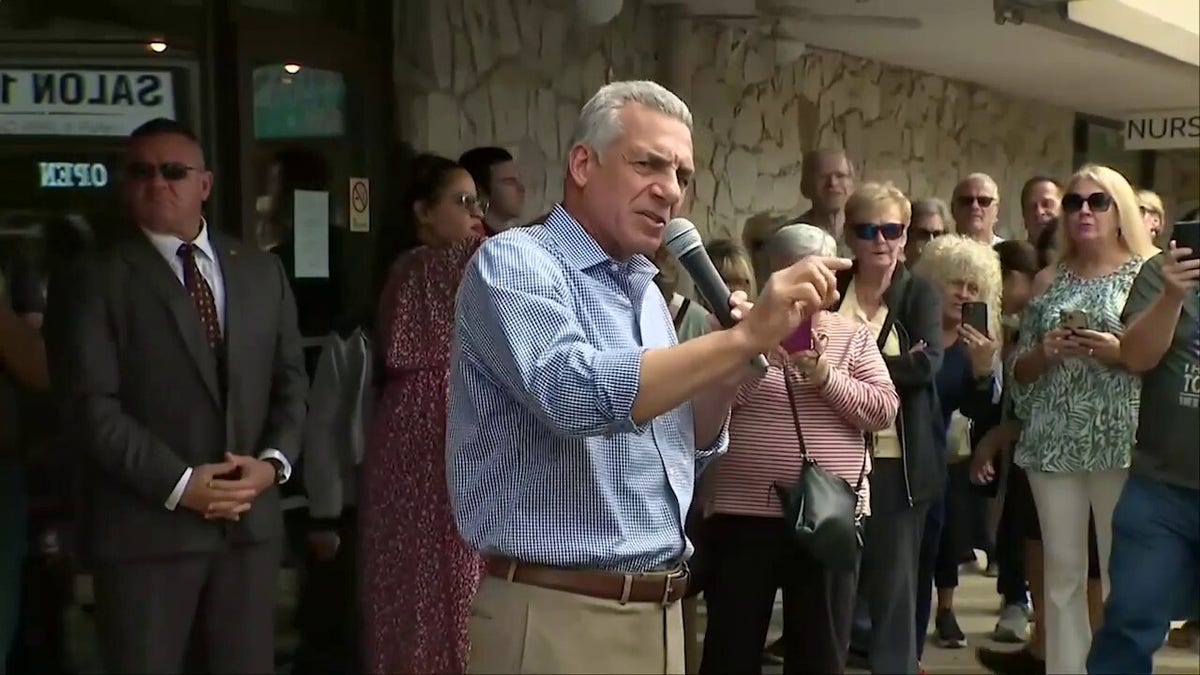
Republican gubernatorial candidate Jack Ciattarelli speaks during a town hall in Manchester Township, N.J., Saturday, as supporters look on. (Fox News)
He also accused her of backing policies on transgender athletes, saying «this mother of two daughters voted yes twice to allow biological boys to play in girls’ sports.» Sherrill in fact voted against GOP bills in 2023 and 2025 that would have banned transgender students from competing based on gender identity.
On immigration enforcement and policing, Ciattarelli said Sherrill «supports sanctuary cities» and «voted anti-police… looking to get rid of qualified immunity.» Sherrill has spoken favorably of New Jersey’s 2018 «Immigrant Trust Directive» and supported the George Floyd Justice in Policing Act, which sought to curtail qualified immunity and policy police unions opposed.
He also attacked the congresswoman’s opposition to the GOP’s 2025 «One Big Beautiful Bill Act,» which raised the SALT deduction cap to $40,000, expanded child credits and eliminated federal taxes on overtime and tips. Sherrill and all House Democrats voted no on the package.
TOP GUBERNATORIAL RACE ROCKED BY ALLEGATIONS OF LEAKS AND DIRTY TRICKS AMID IMPROPER MILITARY RECORDS RELEASE
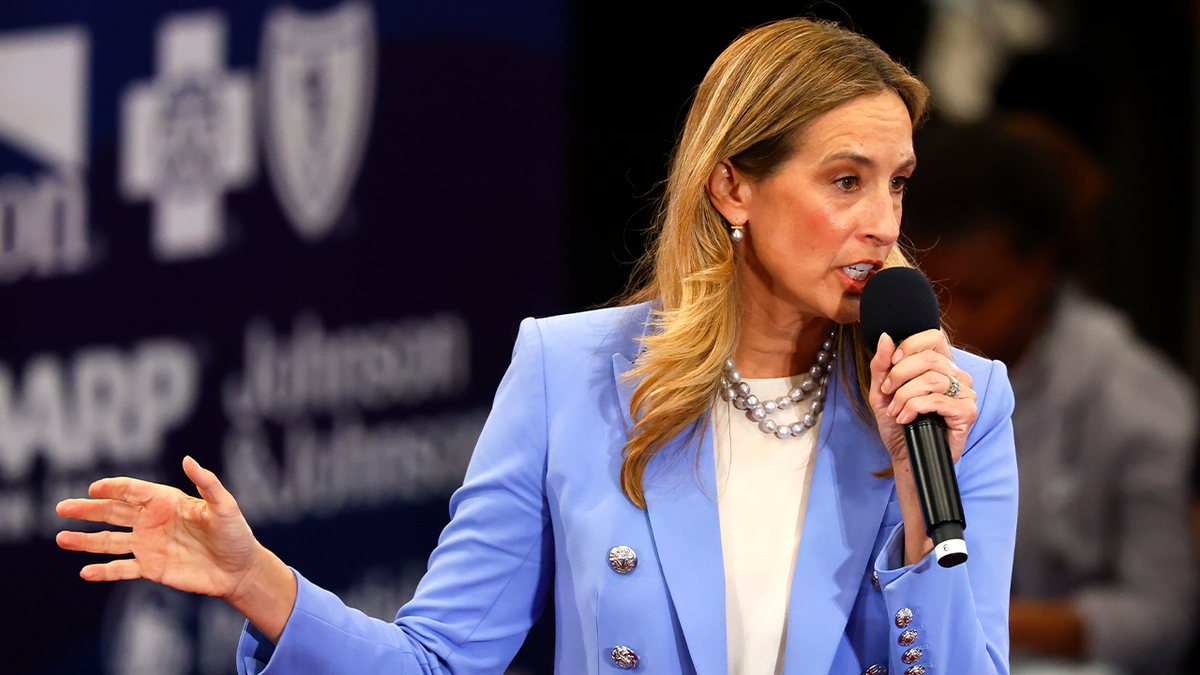
Democrat Mikie Sherrill responds to questions during the first general election gubernatorial debate with Republican opponent Jack Ciattarelli, Sept. 21, in Lawrenceville, N.J. (AP Photo/Noah K. Murray)
Ethics featured prominently in Ciattarelli’s critique. He reminded voters Sherrill paid a fine under the STOCK Act after disclosing stock trades late and noted her household traded shares in defense companies while she sat on the House Armed Services Committee, though she divested individual holdings in 2019.
He also covered recent reports that Sherrill was disciplined in the 1994 Naval Academy cheating scandal for failing to report classmates, which barred her from walking at graduation even though she was commissioned.
Beyond the policy contrasts, Ciattarelli sought to cast Sherrill as aligned with the left.
Reporting shows she welcomed support from Zohran Mamdani, the socialist nominee for New York City mayor, saying she shared his voters’ goal of «throwing out the old playbook.» Republicans labeled the embrace «disqualifying» and warned New Jerseyans could not afford such politics.
He also pointed to her remarks after the House voted to honor conservative activist Charlie Kirk following his assassination. Sherrill said Kirk had «advocated for a Christian nationalist government and to roll back the rights of women and Black people,» while adding that the Constitution protects free speech «even for those I vehemently oppose.» Sherrill voted for the resolution.
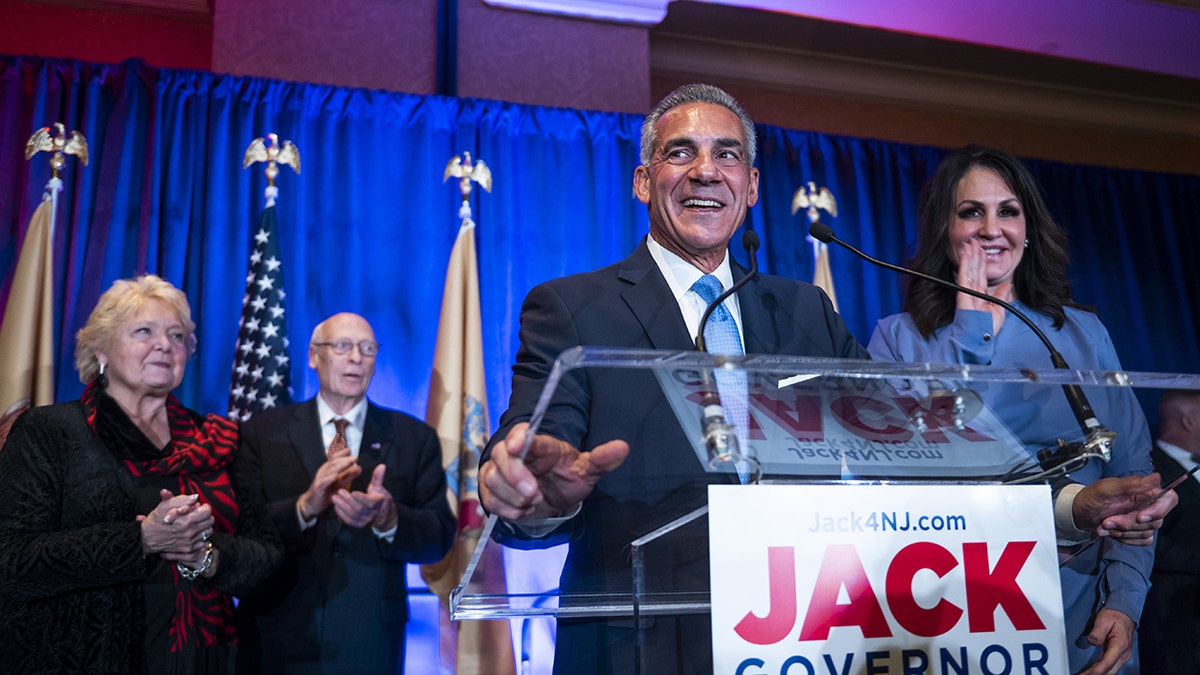
Jack Ciattarelli, Republican candidate for governor of New Jersey, has been endorsed by President Donald Trump. (Mark Kauzlarich/Bloomberg via Getty Images)
Throughout his remarks, Ciattarelli framed Sherrill as left-wing despite her record of caucusing with moderates. Sherrill once belonged to the centrist Blue Dog Coalition and is now a member of the New Democrat Coalition.
Ciattarelli, by contrast, leaned into his local roots, calling himself the «Jersey guy» and stressing that his family has lived and run businesses in the state for a century. «How about we elect the Jersey guy? Ciattarellis have been here for a hundred years… always will be,» he said.
Sherrill, a Navy helicopter pilot and Virginia native, was first elected in 2018 and has lived in Montclair with her family since 2010.
CLICK HERE TO GET THE FOX NEWS APP
Ciattarelli, a CPA and former assemblyman, was the GOP nominee for governor in 2021. Polls suggest their 2025 rematch is close.
Ciattarelli’s attacks showcase his strategy of portraying Sherrill as tied to national Democrats and ethically compromised while presenting himself as a homegrown alternative.
Fox News Digital has reached out to both campaigns for comment on Ciattarelli’s remarks and Sherrill’s past statements.
new jersey,politics,governors,2025 2026 elections coverage,democrats

 CHIMENTOS1 día ago
CHIMENTOS1 día agoMario Massaccesi confesó toda la verdad detrás de su fuerte pelea con Paula Bernini

 POLITICA2 días ago
POLITICA2 días agoPatricia Bullrich: “Kicillof tiene que hacerse cargo del problema enorme de inseguridad que tiene la provincia de Buenos Aires”

 ECONOMIA2 días ago
ECONOMIA2 días agoEl Gobierno empezó a recuperar reservas: se aceleró la liquidación y el Tesoro aprovechó para comprar unos USD 700 millones



